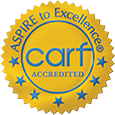Family group therapy, or family groups, are specialized group therapy sessions that focus on the family as a whole, rather than just on the condition of the addict. Family groups can focus on educating family members about the addiction and prepare them for dealing with early recovery, or they can focus on providing a space for managing family conflict and issues that have arisen in the treatment process. At Pax House, our family groups provide a mixture of psycho-education about the disease and a safe space for emotional expression and healing.
When one component of the family system is sick, the whole family is affected. Many family members do not know how to provide help and support for their loved one, which can lead to unmanageable levels of stress at home. Family groups provide understanding and insight into the disease, and impart the skills and techniques family members can use to support an addict through recovery. Difficult issues of co-dependence, abuse and personality conflict can be discussed in the safe and supportive environment of a family group facilitated by our staff. In this way, families can begin to heal the broken relationships that contributed to the development of the addiction in the first place, and work towards developing a healthier home environment for all family members.
At Pax House, we offer family groups on a weekly basis for the immediate family members of our clients at our facility. Depending on the situation, this might include spouses, parents, siblings, and children. In some circumstances, other family members or loved ones might be involved; however, typically only the immediate family participates.

